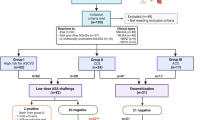Abstract
Aspirin allergy in a patient with acute coronary syndrome represents one of the more urgent challenges an allergist may face. Adverse reactions to aspirin are reported in 1.5 % of patients with coronary artery disease. A history of adverse reaction to aspirin often leads to unnecessary withholding of this medication or use of alternative antiplatelet therapy which may be inferior or more costly. Aspirin therapy has been shown to reduce morbidity and mortality in patients with coronary artery disease. Rapid aspirin challenge/desensitization in the aspirin allergic patient has been consistently shown to be both safe and successful in patients with acute coronary syndromes.


Similar content being viewed by others
References
Papers of particular interest, published recently, have been highlighted as: • Of importance
Amsterdam EA et al. 2014 ACC/AHA guideline for the management of patients with non-ST-elevation acute coronary syndromes: a report of the American College of Cardiology/American Heart Association Task Force on Practice Guidelines. Circulation. 2014;130:2354–94.
Wong JT, Nagy CS, Krinzman SJ, et al. Rapid oral challenge-desensitization for patients with aspirin-related urticaria-angioedema. J Allergy Clin Immunol. 2000;105:997–1001.
De Luca G, Verdoia M, Binda G, et al. Aspirin desensitization in patients undergoing planned or urgent coronary stent implantation. A single-center experience. Int J Cardiol. 2013;167(2):561–3.
McMullan KL, Wedner HJ. Safety of aspirin desensitization in patients with reported aspirin allergy and cardiovascular disease. Clin Cardiol. 2013;36:25–30.
Rossini R, Angiolillo DJ, Musumeci G, et al. Aspirin desensitization in patients undergoing percutaneous coronary interventions with stent implantation. Am J Cardiol. 2008;101:786–9.
Silberman S, Neukirch-Stoop C, Steg PG. Rapid desensitization procedure for patients with aspirin hypersensitivity undergoing coronary stenting. Am J Cardiol. 2005;95:509–10.
Fajt ML, Petrov AA. Outpatient aspirin desensitization for patients with aspirin hypersensitivity and cardiac disease. Crit Pathw Cardiol. 2011;10:17–21.
Cortellini G, Testi S, Severino M, et al. Aspirin challenge/desensitisation before coronary stenting in subjects with history of hypersensitivity. A pragmatic approach. Eur Ann Allergy Clin Immunol. 2012;44(4):160–2.
Dalmau G, Gaig P, Gazquez V, Merce J. Rapid desensitization to acetylsalicylic acid in acute coronary syndrome patients with NSAID intolerance. Rev Esp Cardiol. 2009;62:224–5.
Ortega-Loayza AG, Raza S, Minisi AJ, et al. Aspirin desensitization/challenge in 3 patients with unstable angina. Am J Med Sci. 2010;340:418–20.
Christou A, Kafkas N, Marinakos A, et al. Rapid desensitisation of patients with aspirin allergy who undergo coronary angioplasty. Hell J Cardiol. 2011;52(4):307–10.
Jenneck C, Juergens U, Buecheler M, Novak N. Pathogenesis, diagnosis, and treatment of aspirin intolerance. Ann Allergy Asthma Immunol. 2007;99:13e21.
Feng CH, White AA, Stevenson DD. Characterization of aspirin allergies in patients with coronary artery disease. Ann Allergy Asthma Immunol. 2013;110(2):92–5. This article reviews 9,565 patients who were identified in a medical record with CAD and aspirin listed as an “allergy”. The article reports the nature of these reactions and also highlights the underutilization of aspirin challenge/desensitization.
Meyboom RHB, Lindquist M, Egberts ACG. An ABC of drug related problems. Drug Saf. 2000;22:415–23.
Gollapudi RR, Teirstein PS, Stevenson DD, Simon RA. Aspirin sensitivity: implications for patients with coronary artery disease. JAMA. 2004;292:3017e3023.
Kowalski ML, Asero R, Bavbek S, et al. Classification and practical approach to the diagnosis and management of hypersensitivity to nonsteroidal anti-inflammatory drugs. Allergy. 2013;68:1219–32. A comprehensive review describing the various hypersensitivity syndromes associated with aspirin and NSAIDs. Proposed diagnostic evaluation is also described.
Rajan JP, Wineinger NE, Stevenson DD, White AA. Prevalence of aspirin-exacerbated respiratory disease among asthmatic patients: a meta-analysis of the literature. J Allergy Clin Immunol. 2015;135(3):676.
Mastalerz L, Setkowicz M, Szczeklik A. Mechanism of chronic urticaria exacerbation by aspirin. Curr Allergy Asthma Rep. 2005;5(4):277–83.
Woessner KM. Aspirin desensitization for cardiovascular disease. Curr Opin Allergy Clin Immunol. 2015;15(4):314–22.
Katz Y, Goldberg N, Kivity S. Localized periorbital edema induced by aspirin. Allergy. 1993;48:366–9.
Leeyaphan C, Kulthanan K, Jongjarearnprasert K, Dhana N. Drug-induced angioedema without urticaria: prevalence and clinical features. J Eur Acad Dermatol Venereol. 2010;24:685–91.
Himly M, Jahn-Schmid B, Pittertschatscher K, Bohle B, Grubmayr K, Ferreira F, et al. IgE-mediated immediate-type hypersensitivity to the pyrazolone drug propyphenazone. J Allergy Clin Immunol. 2003;111:882–8.
Phills J, Perelmutter L. IgE and non-IgE mediated allergic-type reactions to aspirin. Acta Allergol. 1974;29:474–9.
Blanca M, Perez E, Garcia JJ, et al. Angioedema and IgE antibodies to aspirin: a case report. Ann Allergy. 1989;62:295–8.
Aun MV, Blana M, Garro LS, et al. Nonsteroidal anti-inflammatory drugs are major causes of drug-induced anaphylaxis. J Allergy Clin Immunol. 2014;2:414–20. A review of anaphylaxis caused by medications. In this review NSAIDs are noted to be the most frequent cause of anaphylaxis in patients presenting to the emergency department with a drug reaction. The article also reports an underutilization of epinephrine in patients presenting with anaphylaxis.
Ward KE, Archambault R, Mersfelder TL. Severe adverse skin reactions to nonsteroidal antiinflammatory drugs: a review of the literature. Am J Health Syst Pharm. 2010;67(3):206–13.
Aseros R. Oral aspirin challenges in patients with a history of intolerance to single non-steroidal anti-inflammatory drugs. Clin Exp Allergy. 2005;35:713–6.
The CURRENT–OASIS 7 Investigators. Dose comparisons of clopidogrel and aspirin in acute coronary syndromes. N Engl J Med. 2010;363:10.
Anderson JL, Adams CD, Antman EM. 2011 ACCF/AHA focused update on the management of patients with unstable angina/non-ST-elevation myocardial infarction. Circulation. 2011;123:2022–60.
Kern M. Conversations in cardiology: what to do if your patient can’t take aspirin after stenting. Cath Lab Digest. 2014;22:10.
Lee RU, Stevenson DD. Aspirin-exacerbated respiratory disease: evaluation and management. Allergy Asthma Immunol Res. 2011;3:3–10.
Author information
Authors and Affiliations
Corresponding author
Ethics declarations
Conflict of Interest
Drs. Cook and White declare no conflicts of interest.
Human and Animal Rights and Informed Consent
This article does not contain any studies with human or animal subjects performed by any of the authors.
Additional information
This article is part of the Topical Collection on Anaphylaxis and Drug Allergy
Rights and permissions
About this article
Cite this article
Cook, K.A., White, A.A. Rapid Aspirin Challenge in Patients with Aspirin Allergy and Acute Coronary Syndromes. Curr Allergy Asthma Rep 16, 11 (2016). https://doi.org/10.1007/s11882-015-0593-2
Published:
DOI: https://doi.org/10.1007/s11882-015-0593-2




